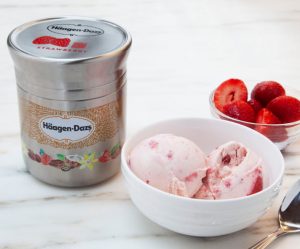Loop is a zero-waste platform from a coalition of major consumer product companies to replace one-time packaging with reusable containers, and they will launch its first pilots this year. The more I read about it, the more I realized the tremendous future potential the design of this project has and how it is a real example embracing many issues we discussed in class. Let’s get started!

Loop worked with well-known brands as Procter & Gamble, Nestle, PepsiCo, Unilever, and more than a dozen others for over a year to develop this new platform. Each package is intended for 100 or more uses. In the early introduction, products will be offered through Loop’s website. When you order, for instance, deodorant or mouthwash, a deposit will be paid for the bottle – which will come with a recyclable tote. When products are used, the empty containers will be thrown back in the tote. When the tote is filled, you can go to the Loop website to request a delivery driver to pick it up or, as well as that, drop it off at their store.

Eight out of ten companies listed by Greenpeace as the world’s largest contributors to the plastic waste crisis are actually part of Loop. The fact that these are major brands – like Tide and Gillet – is beneficial for several reasons. Firstly, it shows how the largest brands are accepting that packaging needs to change towards reusability and compostable plastic. Secondly, the commitment of larger brands has an enormous impact and potential to scale up. And finally, the fact that Loop is partnering with leading companies – and not niche brands targeting only green consumers – is noteworthy. The CEO of TerraCycle– partner behind the project – stated: “We don’t need to prove our brand of shampoo or ice-cream – like Haagen-Dazs. It is already the best. It is just giving them an alternative way to access those things.”

Moreover, Loop’s platform believes that shifting the ownership of a package from the consumer back to the brand drive numerous opportunities: it’s no longer a cost, but an asset. Instead of aiming the cheapest packaging, you aim for a better-looking or better-performing packing. Furthermore, Loop’s baseline is “to create systems that don’t make you change.” This is, they aim to reach mass-adoption by being as convenient as throwing something in the trash – and, factually, even easier than recycling. Likewise, the cost of the products will be similar to the one paid now.

So, essentially, regarding what we discussed in class: Loop is generating an outstanding impact by working with international brands; they make use of the closed-loop recycling business model, they understood sustainability as a way to enhance efficiency and, finally, they managed to overcome the “changing-behavior” barrier.

I love how larger companies are scaling up sustainable initiatives and taking ownership of their packaging. The initiative of Loop is exciting news, however, its baseline to “create systems that don’t make you change” almost seems utopian. I understand that they are trying to make the system as convenient as possible for customers but their marketing can be perceived as slightly untruthful. Change will always occur no matter how drastic the new system is or not. Therefore, Loop’s baseline should be edited to acknowledge change – saying something like to “create systems that make change easier”.